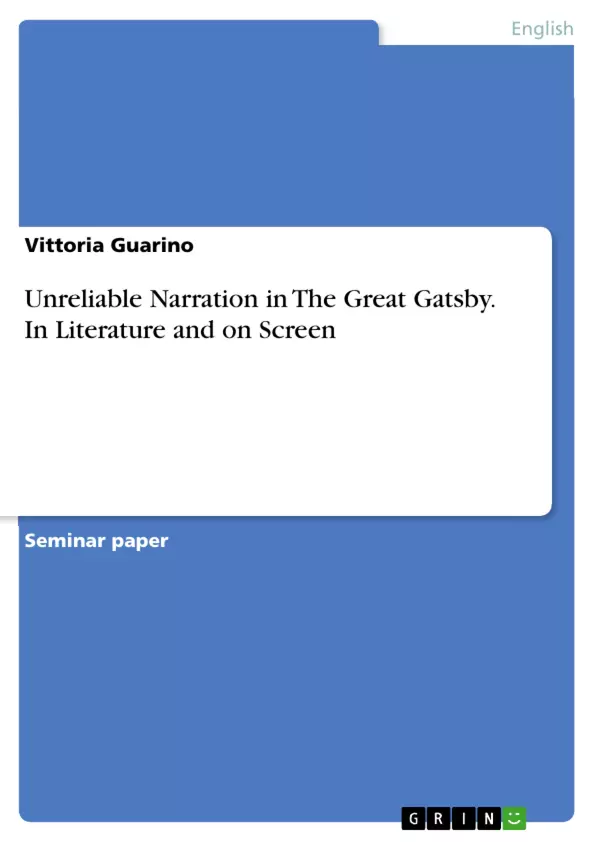This research paper delves into the acclaimed work of literary realism, "The Great Gatsby" by F. Scott Fitzgerald, and its cinematic adaptation by Baz Luhrmann in 2013. Rather than debating fidelity or artistic superiority between literature and cinema, the focus is on exploring adaptations as autonomous artworks.
The paper specifically concentrates on the narration in both modalities, recognizing its pivotal role in shaping the plot, events, and audience reception. The narrowed scope centers on the examination of elements of unreliable narration in "The Great Gatsby" and how they are transposed onto the screen in the 2013 adaptation.
The methodology involves traversing cinematic and literary studies, beginning with a definition of narration, followed by an analysis of narration in the novel, an introduction to unreliable narration, and a subsequent exploration of unreliable elements in both, the book and the film. The study aims to conclude with a summary, evaluation of findings, and consideration of potential limitations encountered during the analysis.
Inhaltsverzeichnis (Table of Contents)
- 1 Introduction
- 2 Defining Narration
- 2.1 The Narration in The Great Gatsby
- 3 Defining Unreliable Narration
- 3.1 Elements of Unreliability in the Narration of The Great Gatsby
- 4 Narration in Film Adaptations
- 4.1 Unreliable Narration in Film Adaptations
- 4.2 The Narration and its Elements of Unreliability in the film The Great Gatsby by Baz Luhrmann
- 5 Conclusion
Zielsetzung und Themenschwerpunkte (Objectives and Key Themes)
This research paper aims to analyze the narration in F. Scott Fitzgerald’s novel The Great Gatsby and its 2013 film adaptation by Baz Luhrmann, specifically focusing on elements of unreliable narration and how they are represented in both mediums. The paper explores the unique features of narration in literature and film, and how these features contribute to the overall understanding and reception of the narrative.
- The role of narration in shaping the understanding and reception of narratives
- Defining and analyzing unreliable narration in literature and film
- Examining the specific elements of unreliable narration in The Great Gatsby
- Comparing and contrasting the representation of unreliable narration in the novel and the film adaptation
Zusammenfassung der Kapitel (Chapter Summaries)
The paper begins by defining the concept of narration and its importance in storytelling. It then delves into the specific narration in The Great Gatsby, identifying the narrator, their perspective, and the temporal and structural aspects of the narrative. The analysis highlights the novel’s non-linear structure and fragmented nature, typical of modernist literature.
The following chapter defines unreliable narration and explores its key elements. This sets the stage for the analysis of unreliable narration in The Great Gatsby, which examines how the narrator’s biases, limitations, and perspectives shape the events and characters of the story.
The paper then shifts its focus to film adaptations, introducing a theoretical framework for analyzing cinematic narration. It explores the characteristics of unreliable narration in films and how they are employed to enhance the narrative and create specific effects on the audience.
The final section examines the specific elements of unreliable narration in the 2013 film adaptation of The Great Gatsby by Baz Luhrmann, comparing them to the novel’s representation and analyzing how the film adaptation reinterprets and adapts the themes and prosody of its source text.
Schlüsselwörter (Keywords)
The paper explores the concepts of narration, unreliable narration, film adaptations, and the specific case of The Great Gatsby by F. Scott Fitzgerald and its 2013 film adaptation by Baz Luhrmann. It utilizes theoretical frameworks from literary and cinematic studies to analyze the unique features of narration in both mediums and to assess how the themes and elements of the source text are translated to the screen.
- Arbeit zitieren
- Vittoria Guarino (Autor:in), 2023, Unreliable Narration in The Great Gatsby. In Literature and on Screen, München, GRIN Verlag, https://www.hausarbeiten.de/document/1419391


